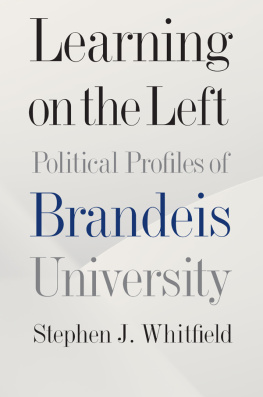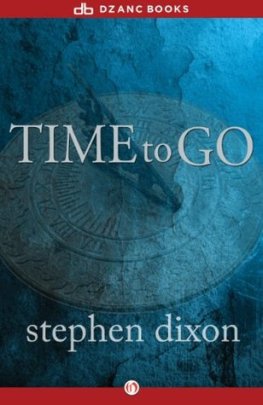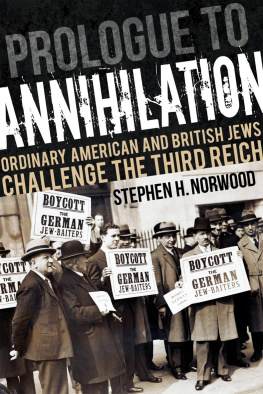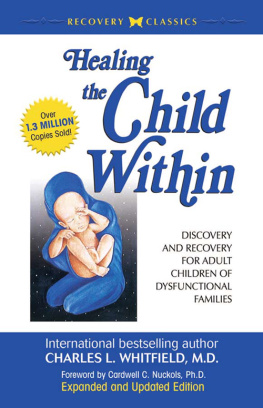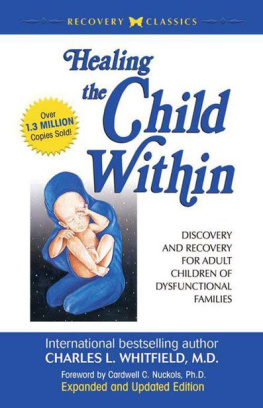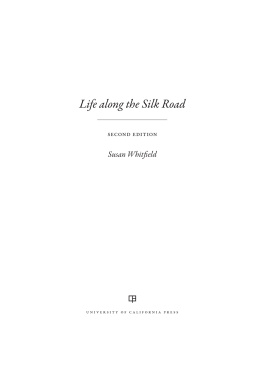American Space Jewish Time
American Space Jewish Time
Essays in Modern Culture and Politics
Stephen J. Whitfield
First published 1988 by M.E. Sharpe
Published 2015 by Routledge
2 Park Square, Milton Park, Abingdon, Oxon OX14 4RN
711 Third Avenue, New York, NY 10017, USA
Routledge is an imprint of the Taylor & Francis Group, an informa business
Copyright 1988 by Stephen J. Whitfield. All rights reserved.
No part of this book may be reprinted or reproduced or utilised in any form or by any electronic, mechanical, or other means, now known or hereafter invented, including photocopying and recording, or in any information storage or retrieval system, without permission in writing from the publishers.
Notices
No responsibility is assumed by the publisher for any injury and/or damage to persons or property as a matter of products liability, negligence or otherwise, or from any use of operation of any methods, products, instructions or ideas contained in the material herein.
Practitioners and researchers must always rely on their own experience and knowledge in evaluating and using any information, methods, compounds, or experiments described herein. In using such information or methods they should be mindful of their own safety and the safety of others, including parties for whom they have a professional responsibility.
Product or corporate names may be trademarks or registered trademarks, and are used only for identification and explanation without intent to infringe.
Libraryof Congress Cataloging-in-Publication Data
Whitfield, Stephen J., 1942
American space, Jewish time : Essays in modern culture and politics /
Stephen J. Whitfield.
p. cm.
Previously published: Hamden, Conn. : Archon Books, 1988.
Includes bibliographical references and index.
ISBN 1-56324-932-4 (pbk. : alk. paper)
1. JewsUnited StatesCivilization.
2. United StatesCivilizationJewish influences.
3. JewsUnited StatesPolitics and government.
4. United StatesEthnic relations.
I. Title.
E184.J5W489 1996
973.04924dc20
96-16856
CIP
ISBN 13: 9781563249327 (pbk)
For Kim and Andrea, with love
CONTENTS
Every historian dreams of a review akin to that accorded to Yosippon, a tenth-century chronicle, written in Hebrew, of the Second Temple period. Tam Ibn Yahia noted that all the words of this book are righteousness and truth, and there is no wrong within it. The reviewer added, a bit defensively, that although it is characteristic of historical works to exaggerate things that never were [and] to invent things that never existed, this book, although it is part of the same genre, is nevertheless completely distinct from them
If there is any truth and righteousness seeping from this book, the criticism and example of estimable colleagues, associates, and friends are in large measure responsible. Those who have helped me, whether by their conversation, their own research and writings, or their gleeful pouncing upon my errors and my misinterpretations, are too numerous to mention. To list all of them would tax the patience of the reader a little too early; my apologies are therefore added to my gratitude. But a special salute must be accorded to Albert S. Axelrad, Richard H. King, Richard S. Tedlow, and Cary D. Yales, for having taught me so much. Some of the chapters have been criticized and commented upon in earlier versions by Steven M. Cohen, Benny Kraut, Howard Marblestone, Alexander Orbach, Jonathan D. Sarna, Marc Lee Raphael, Benjamin Ravid, and Robert S. Wistrich. Though all of these readers are expert in various facets of Jewish studies, they never posted in front of a professor of American studies any forbidding signs that warned: Authorized Personnel Only. The author alone is of course accountable for those errors which remain.
For granting me permission to draw upon those portions of this book that have appeared earlier in different form, I am grateful to the following: the Anti-Defamation League of Bnai Brith, which published Jewish Life in America: Fulfilling the American Dream (1983), for .
I am especially thankful to Donald Altschiller for his lore, knowledge, and relentless prodding, and to Hayim Goldgraber for the friendly demonstration of similar attributes. Extra credit is due Steve Antler, whose friendship and technical virtuosity enormously facilitated this work. Typists of the skill and scrupulousness of Heather Hastings, Shirley Meymaris, Grace Short, and Angelina Simeone have set standards worthy of emulation. James Thorpe of Archon Books has been wonderfully receptive to my thoughts on the topic of American Jewry, which he has helped to stimulate; he has made this book possible. Brandeis University has provided a unique vantage point from which to write it, and its scholarly environment remains especially congenial to the composition of a volume of this kind. Special thanks are extended in particular to two colleagues: Lawrence H. Fuchs and Jacob Cohen. The title of this book was graciously provided by Leonard Fein, who has been indulgent with my larcenous habits with his ideas as well.
I continue to cherish a deep sense of indebtedness to my mother and to my late father, for the ideals of Judaism and of learning that they sought to instill. Bernard and Dorothy Cone had nothing directly to do with the composition of this book, with the design of its argument, or with the sifting of its evidence. But I wish to record a certain pride in my status as their son-in-law. My wife Lee has not only offered the encouragement and support that come naturally to a former co-captain of our high schools cheerleading squad. More importantly she has enriched our home with love. In the spirit of the Jewish people and (it so happens) of this book, she deserves to be included among those whom the Prophet Zechariah (9:12) called prisoners of hope.
The history of the Jews must for ever be interesting, James Madison remarked in a private letter in 1820. The modern part of it is at the same time so little generally known, that every ray of light on the subject has its value. Ever since the former president made that observation, so much has been written about modern Jewish experience that, even if confined to its American locale, the acquisitions librarians can barely keep up with the pace. So crammed are the shelves of books about the Jewsincluding their American branchthat perhaps the sin of adding ever so slightly to that literature cannot be palliated. In this case, however, the sense of wonder that I have tried to satisfy must be honored. They are more than a religious group, for it has included those who accept none of its doctrines, observe none of its rituals. Birth alone has sometimes sufficed for membership; therefore, Jewish memories are relevant. They are more than an ethnic group, for it has included those of every race and color and ancestry. Conversion alone has sometimes sufficed for membership; therefore, Jewish beliefs matter too. Such complications guarantee the enduring aptness of Madisons sense of the awesomeness, the poignancy, and the granular oddity of the history of the Jews.




